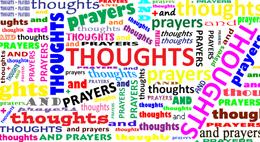


Nobody Cares About Your Thoughts and Prayers
[by Howard Fencl, Hennes Communications]
Don’t give me your phony grief. Don’t pawn off insincere, off-the-shelf template language just because you feel your organization must say something – anything – after a tragedy.
Another school shooting? “Thoughts and prayers.” Environmental catastrophe? “Thoughts and prayers.” Industrial fatality? Well, you get it. And you’ve seen it recited rotely and mindlessly time and again on social media and in the news media.
“Thoughts and prayers” has become a meaningless message, a quick toss-off for those too lazy, and too disrespectful, to stop, turn off their smart phone, close their office door for a minute and think about the tragedy at hand.
A sincere expression of grief is always appropriate when tragedy happens on your watch. Should you do it for your organization’s reputation? Yes, but you should do it first and foremost because it is the right thing to do. It’s the human thing to do. When that time comes – and it will – don’t kneejerk and immediately toss off a hollow cliché. Take a few moments and put yourself in the shoes of the people who have survived. What if this horrible thing – heaven forbid – happened to someone in your family?
You might dig deeper and say something like
“All of us at [YOUR COMPANY] are in shock over the senseless act that took the lives of our colleagues.”
or
“[NAME] was much loved, and will be missed terribly by all of us here.”
or
“We cannot begin to imagine the depth of grief that their families are going through right now.”
These are sincere messages that any one of us may feel when a sudden loss of people we know or love punches us in the gut and grief takes the wind out of us. If you are genuine about your grief, people will connect with you – and perhaps more broadly with your company – because you are human. “Thoughts and prayers” will never get you there.
Another tired perennial phrase that needs to be forever retired: “Our hearts go out.” This ersatz emotion likely crops up because its users, who would normally trot out “thoughts and prayers,” need a quickie message that backs “prayers” out of the picture in fear of offending people who take offense at the notion of praying. Don’t use this phrase either; it has also become vapid and thoughtless.
The final offender – which seems fairly new to the bogus emotion lexicon – is the mortifying
“There are no words.”
Yes there are. You just said four of them. And if you really believe someone’s tragedy is not worth more thought and human emotion than that, then prepare to be pilloried by the always-vigilant, ever-righteous haters who troll social media.
—————————-
Howard Fencl is a vice president at Hennes Communications, and works to help clients with crises capture the complex and heartfelt emotions they want to convey. In his television management career, Howard helped lead WKYC-TV’s coverage of the shootings at Chardon High School in 2012. The news team’s coverage was recognized with an Edward R. Murrow Award for outstanding achievement in broadcast and digital journalism.